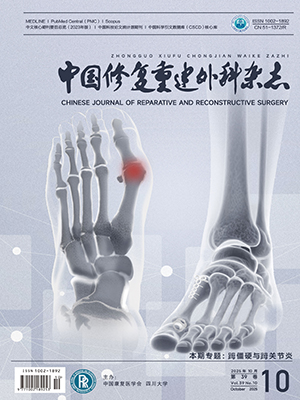Objective To evaluate the biocompatibility and in vivo degradation of novel chest wall prosthesis materials and provide some data for their clinical application. MethodsAccording to the standard for the biological evaluation of the medical devices, several tests were performed to evaluate the tissue toxic effects induced by polydioxanone (Group A), chitosan (Group B), and hydroxyapitite/collagen (Group C),which were tested as component materials of the chest wall prosthesis. In the hemolysis test, 0.2 ml of the anticoagulant rabbit blood was added to the component materials and the normal saline (negative control) and to the distilled water(positive control). Five samples were made in each group. Absorbency was measured and the hemolysis rate was determined. In the acute systemic toxicity test, 20 mice were randomly divided into 4 groups (Groups A, B and C, and the normal saline group, n=5). The leaching liquid (50 ml/kg) was injected through the caudal vein, which was observed at 24, 48 and 72 hours. In the pyrogen test, 12 rabbits were randomly divided into 4 groups (Groups A, B, C and the normal saline group, n=3) the leaching liquid(10 ml/kg) was injected through the ear vein,and the body temperature was recorded within 3 hours. In the in vivo degradable test, the component materials (10 mm×10 mm) were implanted in 12 rabbits at 2, 4, 8, 12, 16 and 24 weeks, respectively, after operation. Two rabbitswere sacrificed for the macroscopic and the microscopic examinations. Results The chest wall component materials had no hemolytic reaction, no acute systemic toxicity, and no pyrogen reaction. The results demonstrated that the implanted materials had only a mild inflammatory reaction during the early days of the grafting, which subsided gradually. There was no tissue denaturation, necrosis or pathological hyperplasia when the prosthesis materials were degraded. Conclusion The degradable materials of the chest wall prosthesis have a good biocompatibility and agreat biological safety though their surgical application still requires a further clinical research.
Citation: GONG Zhiyun,XU Zhifei,QIN Xiong,et al.. RESEARCH ON BIOCOMPATIBILITY AND IN VIVO DEGRADATION OF BIODEGRADABLE CHEST WALLPROSTHESIS MATERIALS IN EXPERIMENTAL ANIMALS. Chinese Journal of Reparative and Reconstructive Surgery, 2007, 21(8): 867-871. doi: Copy
Copyright © the editorial department of Chinese Journal of Reparative and Reconstructive Surgery of West China Medical Publisher. All rights reserved




